Barbarians Were People Who Didn’t Speak Greek
Conny Waters - AncientPages.com - Who were the Barbarians? The term “Barbarians” is misused today. In modern times, we often say Barbarians are uncivilized people or evil people.
However, the true meaning of the word has been forgotten. The word originated in ancient Greece and initially referred to people who did not speak Greek.
A preconnesian marble depiction of a barbarian. Second century AD. Barbarian, so-called Dacian prisoner, Roman artwork. Image credit: Marie-Lan Nguyen - CC BY 2.5
Those of relatively advanced civilizations used the term to describe others considered less civilized. It referred to people from more primitive cultures who usually relied on physical strength more than intellect.
According to Strabo (64 BC - 21 CE), a Greek geographer and historian, people known as Carians, of all the “barbarians,” had a particular tendency to intermingle with the Greeks.
“This was particularly the case with the Carians, for, although the other peoples were not yet having very much intercourse with the Greeks nor even trying to live in Hellenic fashion or to learn our language ... yet the Carians roamed throughout the whole of Greece serving on expeditions for pay. ... and when they were driven thence [from the islands] into Asia, even here they were unable to live apart from the Greeks, I mean when the Ionians and Dorians later crossed over to Asia.” (Strabo 14.2.28)
Today, “barbarian” has another meaning and is used to describe someone using excessive violence without considering other options.
According to Konstantinos Vlassopoulos, a professor of Greek history at the University of Nottingham, the earliest attestation of the word barbarian in Greek literature is in Homer’s descriptions of the Carians as ‘barbarophonoi.’
Vlassopoulos notes that the ancient Greeks used this word in a confusing and contradictory fashion.
They had no agreement among the ancient Greeks regarding who spoke Greek and who didn’t, at least until Alexander the Great.
There “existed a variety of local and regional dialects, which were mutually comprehensible to a larger or smaller degree,” writes Vlassopoulos in his book “Greeks and the Barbarians.”
So, the original meaning of the word “barbarian” did not refer to acts of evil but to those who were not Greek or did not speak Greek. Also, who didn’t talk Greek was a matter of debate among the ancient Greeks.
Written by Conny Waters – AncientPages.com Staff Writer
Copyright © AncientPages.com All rights reserved. This material may not be published, broadcast, rewritten or redistributed in whole or part without the express written permission of AncientPages.com
Updated on January 18, 2023
Expand for referencesReferences:
Malcolm Heath. Review of Inventing the Barbarian, by Edith Hall. The Classical Review 41, no. 1 (1991): 90–92.
More From Ancient Pages
-
 Will-o’-the-wisp: Eerie Lights Over Swamps And Marshes That Frightened And Led People Astray
Featured Stories | Apr 23, 2020
Will-o’-the-wisp: Eerie Lights Over Swamps And Marshes That Frightened And Led People Astray
Featured Stories | Apr 23, 2020 -
 Nakanishi Ruins: One Of Japan’s Largest Ruins Discovered In Nara
Civilizations | Aug 22, 2015
Nakanishi Ruins: One Of Japan’s Largest Ruins Discovered In Nara
Civilizations | Aug 22, 2015 -
 Scientists Attempt To Solve An Ancient Greek Volcano Mystery
Archaeology | Sep 20, 2022
Scientists Attempt To Solve An Ancient Greek Volcano Mystery
Archaeology | Sep 20, 2022 -
 Where Is One Of Colorado’s Most Mysterious Long-Lost Artifacts? Have New Clues Emerged?
Featured Stories | Aug 20, 2024
Where Is One Of Colorado’s Most Mysterious Long-Lost Artifacts? Have New Clues Emerged?
Featured Stories | Aug 20, 2024 -
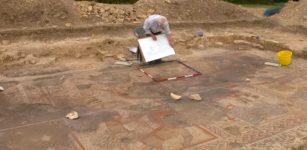 Rare Roman Mosaic Depicting The Adventures Of Greek Hero Achilles Discovered In Rutland, UK
Archaeology | Dec 4, 2021
Rare Roman Mosaic Depicting The Adventures Of Greek Hero Achilles Discovered In Rutland, UK
Archaeology | Dec 4, 2021 -
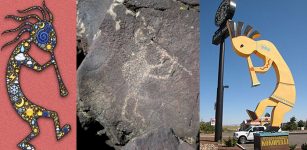 Kokopelli – Popular Trickster God Of The American Southwest Brought Happiness To People
Featured Stories | May 11, 2020
Kokopelli – Popular Trickster God Of The American Southwest Brought Happiness To People
Featured Stories | May 11, 2020 -
 On This Day In History: The Only English Pope In History Of Catholic Church Elected – On Dec 4, 1154
News | Dec 4, 2016
On This Day In History: The Only English Pope In History Of Catholic Church Elected – On Dec 4, 1154
News | Dec 4, 2016 -
 Earliest Period Of Warfare In Europe Occurred Over 1,000 Years Earlier Than We Thought
Archaeology | Nov 3, 2023
Earliest Period Of Warfare In Europe Occurred Over 1,000 Years Earlier Than We Thought
Archaeology | Nov 3, 2023 -
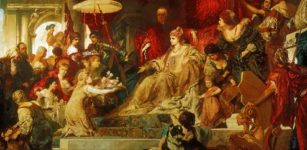 Tragic Reign Of Caterina Cornaro – The Last Queen Of Cyprus And Patron Of The Arts
Featured Stories | Jul 4, 2019
Tragic Reign Of Caterina Cornaro – The Last Queen Of Cyprus And Patron Of The Arts
Featured Stories | Jul 4, 2019 -
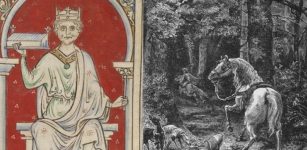 Was King William II Murdered In The New Forest?
Featured Stories | Aug 5, 2021
Was King William II Murdered In The New Forest?
Featured Stories | Aug 5, 2021 -
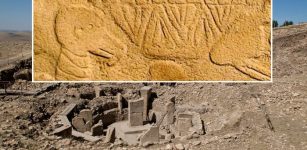 World’s Oldest Lunisolar Calendar May Have Been Discovered At Göbekli Tepe, Turkey
Archaeology | Aug 7, 2024
World’s Oldest Lunisolar Calendar May Have Been Discovered At Göbekli Tepe, Turkey
Archaeology | Aug 7, 2024 -
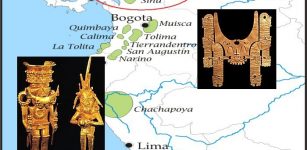 Malagana Remarkable Sophisticated Goldwork: Legacy Of Colombian Pre-Hispanic Culture
Artifacts | Nov 14, 2018
Malagana Remarkable Sophisticated Goldwork: Legacy Of Colombian Pre-Hispanic Culture
Artifacts | Nov 14, 2018 -
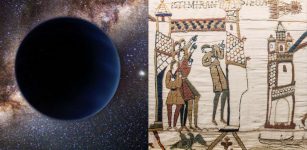 Famous Bayeux Tapestry May Solve The Planet Nine Mystery
Archaeoastronomy | May 5, 2018
Famous Bayeux Tapestry May Solve The Planet Nine Mystery
Archaeoastronomy | May 5, 2018 -
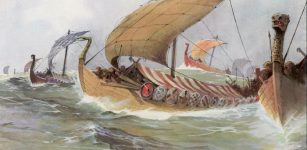 Battle Of Visby – Death Came With King Atterdag’s Ships
Featured Stories | Jul 27, 2022
Battle Of Visby – Death Came With King Atterdag’s Ships
Featured Stories | Jul 27, 2022 -
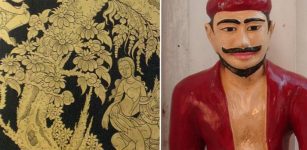 Zawgyi – Demi-God And Alchemist With Miraculous Powers In Burmese Mythology And Folklore
Featured Stories | Aug 17, 2021
Zawgyi – Demi-God And Alchemist With Miraculous Powers In Burmese Mythology And Folklore
Featured Stories | Aug 17, 2021 -
 Llanbadoc Discovery: Late Medieval Artifact And The Battle Of Usk
Artifacts | Oct 2, 2018
Llanbadoc Discovery: Late Medieval Artifact And The Battle Of Usk
Artifacts | Oct 2, 2018 -
 Ancient Romans Invented The First Bound Book
Ancient History Facts | Sep 25, 2017
Ancient Romans Invented The First Bound Book
Ancient History Facts | Sep 25, 2017 -
 World’s Oldest Shoe Is 5,000-Year-Old
Archaeology | Jul 10, 2015
World’s Oldest Shoe Is 5,000-Year-Old
Archaeology | Jul 10, 2015 -
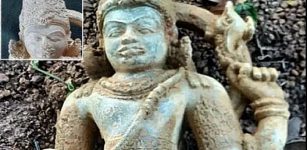 12th Century Idol Of Vishnumurthy Unearthed In Abandoned Well Near Udupi, India
Archaeology | Feb 26, 2021
12th Century Idol Of Vishnumurthy Unearthed In Abandoned Well Near Udupi, India
Archaeology | Feb 26, 2021 -
 Susanoo-no-Mikoto – Shinto God Of The Sea And Storms Was Banished From Heaven
Featured Stories | Nov 23, 2018
Susanoo-no-Mikoto – Shinto God Of The Sea And Storms Was Banished From Heaven
Featured Stories | Nov 23, 2018

